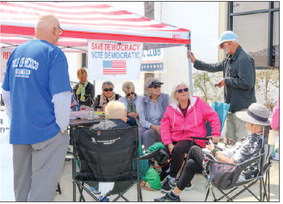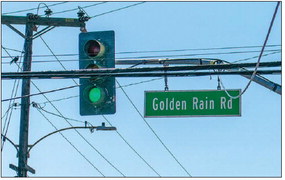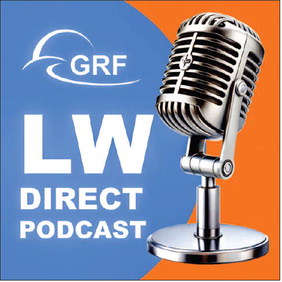Honoring a special orphan
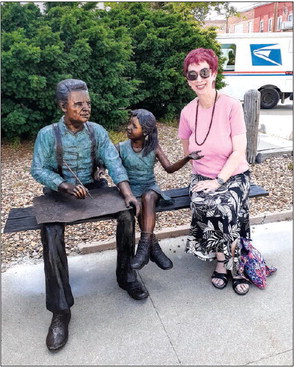

by Patty Marsters
pattym@lwsb.com
Judie Jacobus spent the first weekend of June in Concordia, Kansas, at the annual Celebration of Orphan Train Riders. It’s an event that’s very special to her, as her father took the journey from New York to Ottawa, Kansas, to start a new life at just 2 years old.
The so-called orphan trains operated between 1854 and 1929 and were the precursor to the modern foster care and adoption systems. The system was organized by the New York Children’s Aid Society, with various groups in New York City giving shelter and care for orphans, abandoned children and those kids whose single parents could no longer provide for them before sending them aboard trains to be placed with families throughout the United States and some parts of Canada. An estimated 250,000 children were placed.
To honor her father, as well as pay tribute to John Lukes Jacobus’ career as a letter carrier, Judie was present on June 4 to unveil a commemorative statue in front of the Concordia Post Office. It features a man with a young girl on a bench. “The statue was chosen because I was always very curious as a child and was constantly asking questions and pointing out things I was curious about,” Judie says.
Judie wrote a biography of her father that is displayed inside the National Orphan Train Complex, a restored Union Pacific depot in Concordia that contains displays and information about the Orphan Train program and its riders.
The biography will also be included in the sixth volume of “Orphan Train Riders: Their Own Stories.” Judie includes how the Ottawa (Kansas) Herald described young John as “a particularly engaging little blue-eyed boy . . . friendly, too, for he insisted on shaking the reporter’s hand.”
John graduated from college with the intention of being a teacher, but worked in his family’s greenhouse before moving to Phoenix, Arizona, to be a bookkeeper.
When he requested a copy of his birth certificate before entering the U.S. Army, he discovered that not only was what John thought to be his original surname not the case, but also that he had been celebrating his birthday on the wrong day.
After World War II, John moved again, this time to Long Beach, where he joined the U.S. Postal Service. He also later worked for a local mortuary.
John and his wife, Louise, had one child, Judie, now a resident of Mutual 2.
“My father was an amazing, talented man who overcame much and lead a productive, meaningful life,” Judie says. “I will always be very proud to be his daughter and be able to tell others about his story.”
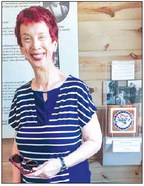
Judie inside the train car housing the story board about her dad. The trivet displayed on the right was made by him.

